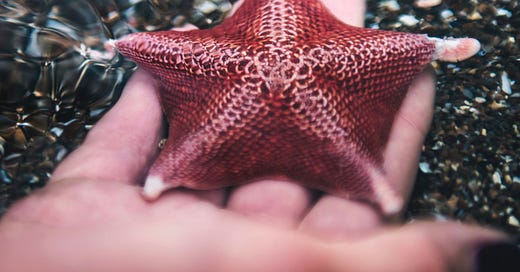I was talking to a friend the other day about the climate crisis that we're experiencing only the beginning of, and I was surprised when she insisted that there is nothing we can do.
"Really?" I said. "You really don't think there's one thing we can do?"
"No, it's entirely too big for one person to have any effect on the outcome. Recycling is pointless. Saving water is pointless. The damage is done." She's not the only one of my friends who has shared those beliefs. But lately I've been surprised at the level of bleakness coming from the people in my circle.
It's no wonder, really. Things seem bleak on a lot of levels right now. There is wide agreement that, environmentally at least, we've reached some kind of tipping point from which we are not going to recover and go "back to normal." The way out of the mess we are in is not through interventions and ideas that we can grasp now; the way out is through pushing the limits of our creative minds.
But that requires the singular person to start with an idea. And here are my loved friends declaring there is not one thing we can do about what's happening. This is basically the antithesis of creativity—believing there is no point because it's "not possible." Sure, it's not possible with the current technology and ideas and frameworks we have available now, but that doesn't mean it isn't possible in the very near future. But it sure as shit won't happen if everyone throws up their hands and believes, decides, and tells everyone else that it's not possible. There is no fertile ground there without the openness to the possibility that we can do something. That we have power. It is not possible to be generative under a belief system that denies our inherent personal power.
A couple of years ago, I attended an event where Yuenmi Park, a North Korean escapee and human rights activist, spoke about the horror of oppression that she has experienced in her life. She spoke about her harrowing escape from North Korea and how it landed her out of the frying pan, into hell, so to speak. Most refugees are either sold into sex slavery or harvested for organs—she was “lucky” to have experienced the former. When she finally escaped, it took her years to learn and grow into the incredibly sharply intelligent woman she is now, who speaks on stages around the world inspiring change and hope in an impossible situation.
Listening to Yuenmi's story and the enormity of the problem, I thought about how impossible it feels—how can we topple authoritarianism, rape, war? How do we stop the grueling cycles of death and horror?
And then I realized that maybe that's not where to start. We can help one person re-educate themselves and rebuild their lives. We can serve a meal to someone who needs it.
There is a mildly cheesy parable that's generally referred to as the starfish story. An old man is walking along the beach and sees a young boy a little ways off, picking things up off the sand and throwing them into the water. As he gets closer to the boy, he sees that the beach is littered with starfish that have been washed up with the tide and are now stuck on the beach. Unless they get back to the water, they will die. The boy is throwing them back into the water, one by one. But there are hundreds of them, maybe even thousands.
The man says to the boy, "Why bother? You can't save all of them."
And the boy says, "But I just made a difference for that one," as he tossed in another starfish.
In our overall bleak outlook about the world, we forget that we can do something that makes a difference for one person. We can do something that makes a difference for our community. We don't have to get hung up on how to “save the world.” That's too big a task for any one person.





Beautiful, and so true. ✨